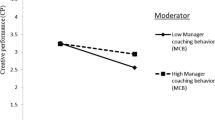Abstract
As a general rule, pathologies tend to impair job performance. In a study involving performance criteria and the Personality Assessment Inventory in a sample of Louisiana police officers (N=800), OCD characteristics correlated significantly in a negative direction with several performance criteria, such as involvement in an on-duty or off-duty at fault moving violation, number of on-duty or off-duty at fault moving violations, any citizen complaints regarding unprofessional conduct, number of unprofessional conduct, and accusation in any way of racially offensive conduct, behavior, verbalization, or complaints. It has been found that the traits of obsessive-compulsive disorder, in moderation, may actually improve performance in police officers. This agrees with the Yerkes-Dodson law, which states that peak performance occurs when a person experiences mild to moderate levels of stress.
Similar content being viewed by others
References
American Psychiatric Association (2000).Diagnostic and statistical manual of mental disorders (text revistion). Washington, DC: APA.
Biggam, F. H., Power, K. G., MacDonald, R. R., Carcary, W. B., & Moodie, E. (1997). Selfperceived occupational stress distress in a Scottish police force.Work and Stress, 11, 118–133.
Butcher, N. J. (1979). Use of the MMPI in personnel selection. In Butcher, J. N. (Ed.),New developments in the use of the MMPI. Minneapolis, MN: University of Minnesota Press.
Colarelli, N. J. & Siegel, S. M. (1964). A method of police personnel selection.The Journal of Criminal Law, Criminology, and Police Science, 55, 287–289.
Decicco, D. A. (2000). Police officer candidate assessment and selection.FBI Law Enforcement Bulletin, 1–6.
Dorgan, W. J. III. (2000). The obsessivecompulsive personality on the job.Modern Machine Shop, 73, 60.
Gottesman, J. (1969).Personality patterns of urban police applicants as measured by the MMPI. Hoboken, NJ: Stevens Institute of Technology.
Hart, P. M., Wearing, A. J., & Headey, B. (1995). Police stress and well-being: Integrating personality, coping, and daily work experiences.Journal of Occupational and Organizational Psychology, 68, 133–156.
Hooke, J. F. & Krauss, H. H. (1971). Personality characteristics of highly rated policemen.Personnel Psychology, 24, 679–686.
Inwald, R. (1988). Five-year follow-up study of departmental termination as predicted by 16 preemployment psychological indicators.Journal of Applied Psychology, 73, 703–710.
Johnson, J. A., & Hogan, R. (1981). Vocational interests, personality, and effective police performance.Personnel Psychology, 34, 49–53.
Kop, N., Euwema, M., & Schaufeli, W. (1999). Burnout, job stress, and violent behavior among Dutch police officers.Work and Stress, 13, 326–340.
Lester, D., Babcock, S. D., Cassissi, J. P., Genz, J. L., & Butler, J. P. (1980). The personalities of English and American Police.Journal of Social Psychology, 111, 153–154.
Levi, L. (1972).Stress and distress in response to psycholsocial stimuli. Elmsford, NY: Pergamon.
McGrath, J. E. (1970). A conceptual formulation for research on stress, inSocial and psychological factors in stress, J. E. McGrath (Ed.). New York: Holt, Rinehart, & Winston, 10–21.
Miller, S. L. (1999).Gender and community policing: Walking the talk. Boston: Northeastern University Press.
Morey, L. C. (1991).The Personality Assessment Inventory: Professional manual. Odessa, FL: Psychological Assessment Resources.
Morey, L. C. (1996).An interpretive guide to the Personality Assessment Inventory (PAI). Odessa, FL: Psychological Assessment Resources.
Murphy, J. J. (1972). Current practices in the use of psychological testing by police agencies.Journal of Criminal Law, Criminology, and Police Science, 63, 570.
Nowicki, S. (1966). A study of the personality characteristics of successful policemen.Police, 10, 39–41.
Pynes, J. E. (2001). The triumph of techniques over purpose revisited: Evaluating police office selection.Review of Public Personnel Administration, 21, 219–236.
Yerkes, R. M., & Dodson, J. (1908). The relation of strength of stimulus to rapidity of habit forming.Journal of Comparative Neurology and Psychology, 18, 459–482.
Author information
Authors and Affiliations
Additional information
Authors' Note: Emily DeCoster-Martin was an undergraduate psychology major at The University of Evansville at the time this paper was written. William U. Weiss, Ph.D., is a professor in the Department of Psychology, The University of Evansville, 1800 Lincoln Av., Evansville, IN 47722. Robert D. Davis, Ph.D., is executive vice-president and director of science, research, and development for Matrix, Inc., Baton Rouge, Louisiana. Cary Rostow, Ph.D. is president of Matrix, Inc.
Rights and permissions
About this article
Cite this article
DeCoster-Martin, E., Weiss, W.U., Davis, R.D. et al. Compulsive traits and police officer performance. J Police Crim Psych 19, 64–71 (2004). https://doi.org/10.1007/BF02813874
Issue Date:
DOI: https://doi.org/10.1007/BF02813874




